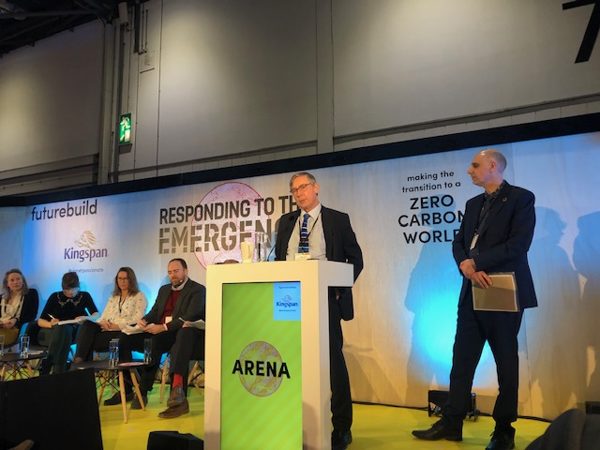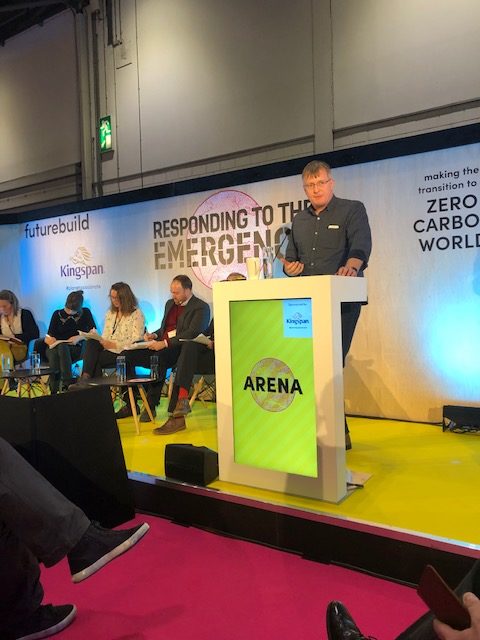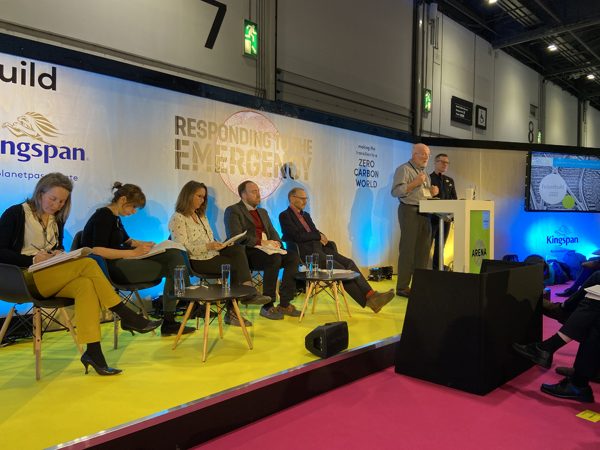CIAT collaborative event calls for 'urgent collective action' to tackle climate emergency
In a CIAT collaborative event at Futurebuild 2020, key representatives from built and natural environment institutions and associations came together to lay out plans of action to mitigate against climate change.
The final day of Futurebuild 2020, which took place at the ExCeL Centre in London between 3-5 March, saw a panel of key representatives from fellow institutions and associations set out their contributions to achieving net zero carbon over the next five years.
Professional Collaboration: Do it together, held at the Arena Stage, was hosted by Eddie Weir PCIAT, President of the Chartered Institute of Architectural Technologists (CIAT) and chaired by BBC Environment Analyst, Roger Harrabin.
Eddie Weir PCIAT opened proceedings with a rallying call to those present about the role professional bodies embody in the fight against climate change.
"As professionals we have a duty to give back and as professional bodies we have a duty to society. These obligations on us, together with our professional Codes of Conduct, and our moral and ethical responses, provide us with the focus and drive to take the Climate Action plan forward and deliver for future generations who will follow us."
In the spirit of cooperation, panel members spoke in pairs about their respective body's aims and objectives for tackling the climate emergency.
Eddie Weir PCIAT, partnered with Dr Gavin Dunn, Chief Executive of the Chartered Association of Building Engineers (CABE), spoke about the vital need for standards and regulations to be adapted for a more sustainable built environment. Eddie said:
"To achieve net zero carbon by 2030, a revision of regulations and standards are required as a matter of urgency to support the professions.
"It is important that we expedite appropriate increased 'minimum' standards within our Building Regulations but re-focus also on enhanced and improved standards within public procurement projects."
He continued:"These enhanced standards should not just be for the environmentally conscious. As professionals, we should be advocating these to our clients now and not waiting on the time-consuming consultation process of regulations to be completed."

The power of professionalism and partnerships was also stressed as a key component to responding to the climate emergency. Mike Cook, Climate Emergency Lead for the Institution of Structural Engineers (IStructE) said:
"Professional institutions' visions need to be aligned. We all need a common vision in what we're trying to achieve: why, how and what we do."
Meanwhile. Ed McCann, Vice-President of the Institution of Civil Engineers (ICE) expressed to the audience the need for professional institutions to develop knowledge and good practice around issues of sustainability and climate change.
He said: "We write the recipe book for how things are done."

Also taking part during the afternoon's session were Adam White, President of the Landscape Institute (LI); Will Pope, Chair of the Society for the Environment (SocEnv) and Adrian Dobson, Executive Director of Professional Services at the Royal Institution of British Architects (RIBA).
After the professional bodies' contributions had been put forward, an independent panel were on hand to provide responses. The panel was made up of Lucy Bruzzone, Programme Director at the Cambridge Institute for Sustainability Leadership; Rachel Hay, Lead Analyst - Buildings for the Committee on Climate Change; Sarah Ratcliffe, CEO of Better Buildings Partnership and Sam Hunter-Jones, Lawyer in Climate Accountability at ClientEarth.

An overarching feeling from responders centered around the imperative demand for collective action in the present moment, as well as the need to put climate change at the forefront of decisions across the industry. Lucy Bruzzone commented:
"While it was fantastic to hear these professional institutions present the critically important collaborative work they are going to undertake over the next five years, the language used should move from what 'we will do' or 'need to do' to 'what we are doing right now'."
Sarah Ratcliffe added: "Integrating sustainability and climate change into the work professional institutions are doing is a necessity. There should be no sustainability add-ons."
CIAT would like to thank Futurebuild for supporting the Institute in this venture and the Edge for the critically important work it has undertaken to ensure we act now to address the climate emergency.
